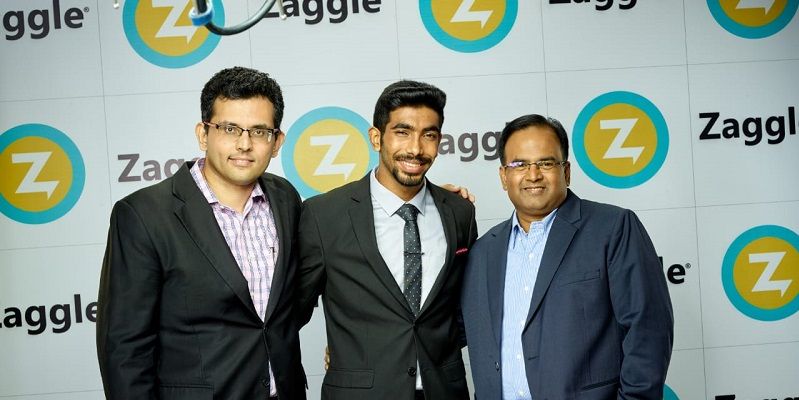Technology is the backbone of many corporates, but when it comes to expense management and giving out employee benefits, many companies have still not gone digital.
To provide a hassle-free platform for corporates to manage their expenses and give employees required benefits, Raj Phani started Zaggle in 2011.
The fintech startup, which started as a corporate cards business, where brands would give cards to customers, has now pivoted to become a full stack B2B SaaS platform.
The Hyderabad-based startup is currently helping corporates and SMEs manage employee engagement and recognition programmes, customer and consumer loyalty programmes, and is also channeling incentives for corporates.
According to the startup, its SaaS solution is enabling companies to retain employees and manage financial expenses better.

(L-R) Zaggle CEO Avinash Godkhindi, brand ambassador Jaspreet Bumrah, and Founder Phani Raj
The startup currently offers an expense management solution, provides automated workflow, drives compliance, and empowers businesses.It also helps companies improve efficiency, accuracy, and faster reimbursements, while reducing unauthorised spends.
A serial entrepreneur, Raj tells YourStory that being in the enterprise segment, he wants to create a complete ecosystem of managing a corporate’s expenses.
He says, COVID-19 has helped Zaggle grow as corporates have been calling in to deploy their software and cards to manage expenses.
How it started?
Zaggle initially started with gifting and reward cards and soon extended to employee benefits. Later, the startup included employee reimbursements and added other business expenses like utility bills.
However, the startup pivoted from a B2B2C to B2B in 2015. The consumer business was becoming expensive and the company had to ‘mothball’ it and focus entirely on B2B business and its employees.
The customer acquisition cost was one tenth of what one would spend on in B2C business. The startup realised that spending $50 per year per customer to acquire an SME or a corporate, with thousands of employees, was far more lucrative than spending $500 on acquiring consumers whose stickiness was not assured.
The product and business model
Once Zaggle gets data on how corporates are spending their money, it consolidates the spending and opens it to a network of banks who can bid to provide working financing to these corporates. This neo banking solution will go live in the next six months, and the startup is beta testing this product. This will be an automated platform that aggregates all the financial resources of a company for a bank.
"People will bid directly for the corporate and we take a small percentage for the loan disbursed. This will be part of the account aggregator model as sanctioned by the RBI, and we will announce the tie up with account aggregator soon," says Raj.
Today, Zaggle’s SaaS solution is used by some of the big names in the manufacturing sector, including CEAT, Hyundai, and Dr Reddy’s.
The company was traditionally competing with Sodexo and card companies like QwikCilvr. However, with its B2B SaaS solutions taking precedence, the cards solution will remain a small option in the entire expense management journey.
The market and business
The B2B fintech SaaS company is digitising spends to unlock value and drive growth. Two years ago, Zaggle had a gross transaction value (GTV) of Rs 600 crore, and it crossed Rs 2,400 crore GTV as of FY 2020. Now, it is aiming for Rs 7,000 crore GTV in the next 18 months.
According to the founder, on the back of this is its three-fold growth in customers to over 3,500 customers. Its net revenue last year stood at Rs 35 crore. Today, it has 4.5 million users and has over 10,000 merchant partners.
Raj says, the market was slow. However, the COVID-19 crisis has led several companies to start their digital journey and look at managing expenses digitally and reward employees with digital points.
While other companies have been slowing down operations, Zaggle, in the past two months, has opened offices in Canada and London.
The Indian fintech software market is forecasted to touch $2.4 billion by 2020 from the current $1.2 billion, as per a report by Nasscom.
The traditionally cash-driven Indian economy has responded well to the fintech opportunity, primarily triggered by a surge in ecommerce and smartphone penetration. The transaction value for the Indian fintech sector is estimated to be approximately $33 billion in 2016 and is forecasted to reach $73 billion in 2020, growing at a five-year CAGR of 22 percent.
Plans ahead
“API sharing has changed the way SaaS can be delivered. It has allowed Zaggle to collaborate with corporates. Blockchain will further change the world because of its immutability and single ledger concept with transparency. This is the future I am betting on,” says Raj.
He says, Zaggle is currently EBITDA positive,and he feels he should rather build a valuable business rather than becoming an unicorn.
"Entrepreneurs must not worry about being Unicorns. Most entrepreneurs are focussing on solving problems. The Indian consumer market is huge and the demand is also huge. The value of consumption, however, is very low, and that's the future because it is only going to increase. Indian policy should help entrepreneurs and startups," says Raj.
Zaggle is now getting into open banking and capital access for SMEs.
“SMEs need capital access. We have started a Founders card with an expense management system, where founders use the card for credit, and we keep a track on their business expenses and therefore increase their credit. Every swipe shows what they have bought in the market and for what purpose. The founders can convert this into an EMI if needed,” says Raj.
(Edited by Megha Reddy)
Want to make your startup journey smooth? YS Education brings a comprehensive Funding Course, where you also get a chance to pitch your business plan to top investors. Click here to know more.
Link : https://yourstory.com/2020/06/fintech-startup-zaggle-b2b-saas-platform
Author :- Vishal Krishna ( )
June 30, 2020 at 05:45AM
YourStory


